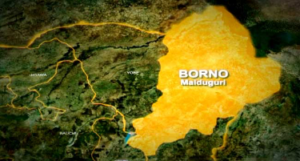The National Agency for Food and Drug Administration and Control (NAFDAC) has ordered the closure of the Gomboru drug market in Maiduguri, Borno State, after it was discovered that contaminated drugs, affected by the recent severe flooding, were being washed and sun-dried for resale. The decision to shut down the market was announced on NAFDAC’s official X handle (formerly Twitter), citing concerns over public health risks due to the compromised drugs.
The Gomboru drug market had been heavily affected when flooding submerged large parts of the area. Many of the drugs stored in shops were contaminated by the floodwaters, which, according to reports, led to some unscrupulous individuals attempting to clean and resell them. This reckless action prompted NAFDAC to take swift and decisive measures. The Director General of NAFDAC immediately ordered the closure of the market, with the agency launching a thorough, shop-to-shop operation to identify and remove all compromised drugs. The goal is to prevent the circulation of these potentially dangerous substances and ensure public safety.
 The devastating flood that triggered this situation was caused by the rupture of the Alau Dam, located on the Ngadda River, just 20 kilometres south of Maiduguri. The flooding wreaked havoc on the city, leading to widespread destruction, displacement, and loss of life. According to the National Emergency Management Agency (NEMA), the flood claimed at least 30 lives and forced an estimated 400,000 people from their homes. The floodwaters inundated entire neighbourhoods, sweeping away homes, businesses, and public facilities.
The devastating flood that triggered this situation was caused by the rupture of the Alau Dam, located on the Ngadda River, just 20 kilometres south of Maiduguri. The flooding wreaked havoc on the city, leading to widespread destruction, displacement, and loss of life. According to the National Emergency Management Agency (NEMA), the flood claimed at least 30 lives and forced an estimated 400,000 people from their homes. The floodwaters inundated entire neighbourhoods, sweeping away homes, businesses, and public facilities.
Ezekiel Manzo, a spokesman for NEMA, confirmed the rising death toll, stating, “The death toll is 30.” He went on to describe the situation as deeply concerning. His colleague, Zubaida Umar, also painted a grim picture of the situation, explaining that around 40 per cent of Maiduguri had been overtaken by floodwaters, leaving residents stranded or displaced. “People have been forced out of their homes and are scattered everywhere,” Umar said. He also warned that the number of displaced persons, which was initially recorded at 414,000, could rise to as many as one million, as many areas remained submerged and inaccessible.
The flooding has had a devastating impact not only on human lives but also on local infrastructure and wildlife. NEMA reports indicate that more than 23,000 households were affected, with over 150,000 people bearing the brunt of the floodwaters. In a related tragedy, Maiduguri’s zoo suffered significant losses, with 80 per cent of the animals perishing in the floods and the remaining 20 per cent escaping into the city, creating further chaos and potential danger for residents.
In addition to the human and animal casualties, the floods have had significant security implications. At least 286 inmates managed to escape from the Maiduguri Medium Security Custodial Centre when floodwaters breached the facility. This development adds to the already dire situation, as security forces are now tasked with tracking down these escapees while also dealing with the larger flood crisis.
The Maiduguri floods serve as a stark reminder of the vulnerability of cities to natural disasters, particularly in regions where infrastructure may not be robust enough to withstand such extreme conditions. The loss of lives, widespread displacement, and the challenges posed by contaminated drugs and escaped animals have created a multifaceted crisis that will require significant effort to address.
As NAFDAC continues its operations to remove contaminated drugs from circulation, and as NEMA and other relief agencies work to provide aid to the displaced, the long-term impacts of this flood on the people of Maiduguri and surrounding areas will be felt for some time. For now, authorities are urging residents to remain vigilant and cautious as the city slowly recovers from one of the most devastating natural disasters it has faced in recent history.




